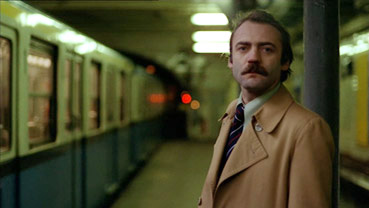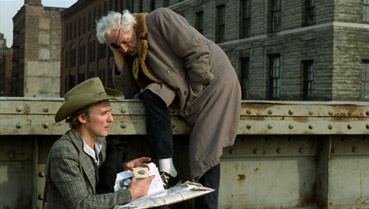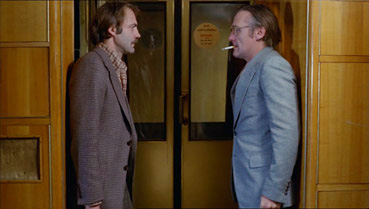|
We
live our lives at the mercy of chance, and it's sometimes
not what we say but how we say it and who we say it to
that unexpectedly shapes our fate. This is certainly the
case for Jonathan Zimmermann, a Hamburg picture framer with
an eye for art, who at an auction meets and declines to
shake the hand of a man he is introduced to. "I've
heard of you," he tells him. Quite what he's heard
is uncertain, but the inference is that it's not that good.
This
simple rebuff sets in motion a series of events that are
to drastically change his life, or at least what remains
of it. Jonathan, you see, has a rare blood disease, one that looks
set to kill him in the not too distant future. Treatment is expensive
and he has a wife and two young children to support and
no way to effectively provide for them after his death.
Then one day he is approached by a Frenchman named Gérard
Blain, who offers him a considerable sum of money if he'll
kill two people for him. Someone bad, he is assured, someone
who has it coming. Blain knows all about Jonathan's illness
and has arranged for him to see an American specialist in
Paris, to get a more detailed and honest evaluation than
the inconclusive feedback he has been prising from his own
doctor. Jonathan meets with the specialist and the prognosis
is grim. He decides to accept Blain's offer and carry out
the first killing (the deal actually requires two), but
can this mild-mannered picture framer really take the life
of another so easily? While he is deliberating on this,
he is visited at his shop by the very man whose hand he
earlier declined to take, an American sporting a cowboy hat
and a not-so-good command of the German language. His name is Tom
Ripley. Aha.

Those
of you approaching Wim Wenders' gripping 1977 thriller The
American Friend retrospectively may well have heard
that name before. A key character in five novels by writer
Patricia Highsmith (the series became known as 'The Ripliad'),
Tom Ripley is one of modern literature's most compelling
antiheroes, a likeable but completely amoral con man who
is occasionally given to murder and always escapes justice.
His first appearance is probably his most famous, The
Talented Mr. Ripley having been made into two successful
films, by René Clément in 1960 as Plein soleil
with Alain Delon in the title role, and by Anthony
Minghella in 1999 under its original title with Matt Damon as Ripley.
Here he is played by Dennis Hopper, an inspired piece of
casting that may not be completely true to Highsmith's original,
but that perfectly captures the blend of relaxed charm
and amoral deadliness that was always what made Ripley such
a fascinating literary character. Despite making the film
on the back of his wild turn as the spaced-out photographer
in Apocalypse Now
and in the second half of a decade spent largely in
a self-confessed drug haze, this is one of Hopper's most
subtle and nuanced performances, and demonstrates just how
fine an actor he really was.
While not the central character here, Ripley is nonetheless the driving force of the plot, the catalyst for the
misadventures that are visited on the unfortunate Jonathan.
As played by the excellent Bruno Ganz, Jonathan is an easy
figure to connect and empathise with – affable, easy-going
and a little too trusting, he's driven by good intentions
rather than greed or malice. Ganz brings a warmth and humanity
to a role that on paper is a potential downer – after all,
he starts the film with a death sentence hanging over him
and things just go downhill from there.
Strongly
character-driven though it may be, Wenders never forgets
that he is making a thriller, and in Jonathan's two contract
hits clearly demonstrates that he can wind up an audience
with the best of them. Both sequences are structured around
train journeys (something of a Wenders signature), the nervous
uncertainty of the first station hit giving way to a bravura
sequence aboard a moving express train for the second, where Ripley's
perfectly timed reappearance expose his true colours to
Jonathan and strengthening the bond that has been growing
between them. It's this developing friendship that provides
the film with its heart, the on-screen chemistry between
Ganz and Hopper igniting their every encounter and injecting
unexpected moments of humour into scenes that would elsewhere
be played with the sternest of faces.

As you'd expect with Wenders, the small detail provides
its share of delights, from the casting of film directors
such as Nicolas Ray, Sam Fuller and Gérard Blain
in the bad guy roles to the offbeat moments that enrich
familiar scenes: Jonathan briefly dozing off and almost
losing the man he is supposed to kill; the train passenger
who is denied entrance to the toilet in which Ripley is
hiding a body and who borrows Jonathan's whisky to wash down
her tablets; Jonathan anticipating his own impending death
with a garrotte and a silenced pistol; the quietly captivating
moment in which he lines the palm of his hand with gold
leaf.
The
American Friend is a fascinating cross cultural
piece, a European-set American novel that has been developed
into hybrid cinema, its multi-national cast and bilingual
dialogue appropriate to a film with distinctly European
sensibilities and pacing, but whose chase sequences are as
breezily cut and incident-packed as any of its Hollywood
contemporaries. Aided immeasurably by some fine work by
regular collaborators Robby Müller (cinematography),
Peter Przygodda (editing) and Jürgen Knieper (music),
Wenders delivers a brooding and compelling blend of character
study and noir thriller, and one that in a time of paper-thin
plots, multi-angle coverage and machine-gun editing, has
stood the test of time handsomely.
A
strong anamorphic 1.77:1 transfer that nicely captures Robby
Müller's gorgeous lighting camerawork, which alternates
between the naturalistic and the expressionistic, where
coloured lighting is used to suggest mood and intent. Sharpness
is fine with no obvious enhancement, and the contrast levels
and shadow detail are very good, coping well with the varying
light levels and Müller's placement of characters against
brighter backgrounds.

The
standard Anchor Bay/Wenders soundtrack options of Dolby
2.0 and 5.1 are on offer, the 5.1 actually using the surrounds
for location effects for a change, albeit subtly.
The
disc included in the Wim Wenders Collection is exactly the
same as the one already released as a stand-alone by Anchor
Bay, and comes complete with its extra features.
Commentary
by Wim Wenders and Dennis Hopper
All of the Wenders commentaries I have heard have proved
enthralling and this one is no exception. As ever we learn
a lot about his influences and the making of the film, including
some choice technical details and information on the actors.
Dennis Hopper has less to say but makes some very worthwhile
contributions and both men have some enjoyable anecdotes
that are not always directly related to this film – Wenders
tells a nice story about John Ford and John Huston, and Hopper
talks about working with Nicolas Ray on Rebel Without
a Cause. Wenders' story of how his career was turned around by Sam Fuller after a viewing of Paper Moon
had convinced him that Alice in the Cities
was no longer worth making (Wenders felt it was essentially
the same movie and that Bogdanovich had beat him to it)
paints Fuller in a particularly glowing light. A lot of
ground is covered here, from Highsmith's initial and later
reactions to the film to a discussion about Bruno Ganz that
laments his abandonment of cinema after repeatedly failing
to find decent roles. The commentary was recorded, of course, before the worldwide
acclaim for his superb performance as Adolf Hitler in Downfall.
Both men are admirers of the work of the other, leading
to a small bit of back slapping and a parting comment from
Wenders to the effect that "I think we are the founding
members of our mutual admiration club."
Deleted Scenes
A number of deleted scenes and single shots
are strung together here, some of which – notably sequences
involving Ripley's housekeeper (removed to suggest he lives
alone) and Marianne's work as an actress and dubbing artist
– are of considerable interest. These can be played with
optional commentary from Wenders, who doesn't have too much
to say, supplying brief explanations as to why scenes were
cut but also pointing out the obvious in places. A short
snip of behind-the-scenes footage leaves him a little baffled.
The picture quality here is close to that of the main feature
and is anamorphically enhanced.
Trailer
(3:13)
This appears to be original German trailer, unhurriedly
edited and not that seductive. The film could be sold better.
Talent
Biographies
Impressively detailed and interesting biographies for Dennis
Hopper, Wim Wenders and Bruno Ganz.
On
the face of it, one of the best specified discs in Anchor
Bay's Wim
Wenders Collection, but this is the very same
disc that has been available as a stand-alone for 4 years
now, and one most Wenders fans will surely already own.
If not, or if you're new to Wenders' work, then it comes
recommended, for the transfer, for the extras, and for the
film itself, which remains one of my favourite of the director's
works, and losing out only to René Clément's Plein soleil as the best Tom Ripley film
to date.
|